In-Depth Analysis: Qualitative Data Analysis Methods and Applications
VerifiedAdded on 2023/04/26
|9
|1010
|464
Report
AI Summary
This report provides an analytical study of qualitative research methods, focusing on thematic analysis, grounded theory, and content analysis. It begins by describing each method, detailing their respective processes, and identifying software packages used in qualitative data analysis. The report further explores the advantages and disadvantages of each method, highlighting their similarities and differences. Thematic analysis is presented as a flexible method for identifying patterned meaning, while grounded theory offers a systematic approach to data collection and analysis, and content analysis focuses on valid inference and interpretation. The study also provides example research questions suitable for each method, offering practical applications in various fields. The report concludes with references to support the analysis and provide further reading on the subject, making it a comprehensive resource for understanding qualitative research methodologies. Desklib provides access to this and many other solved assignments.
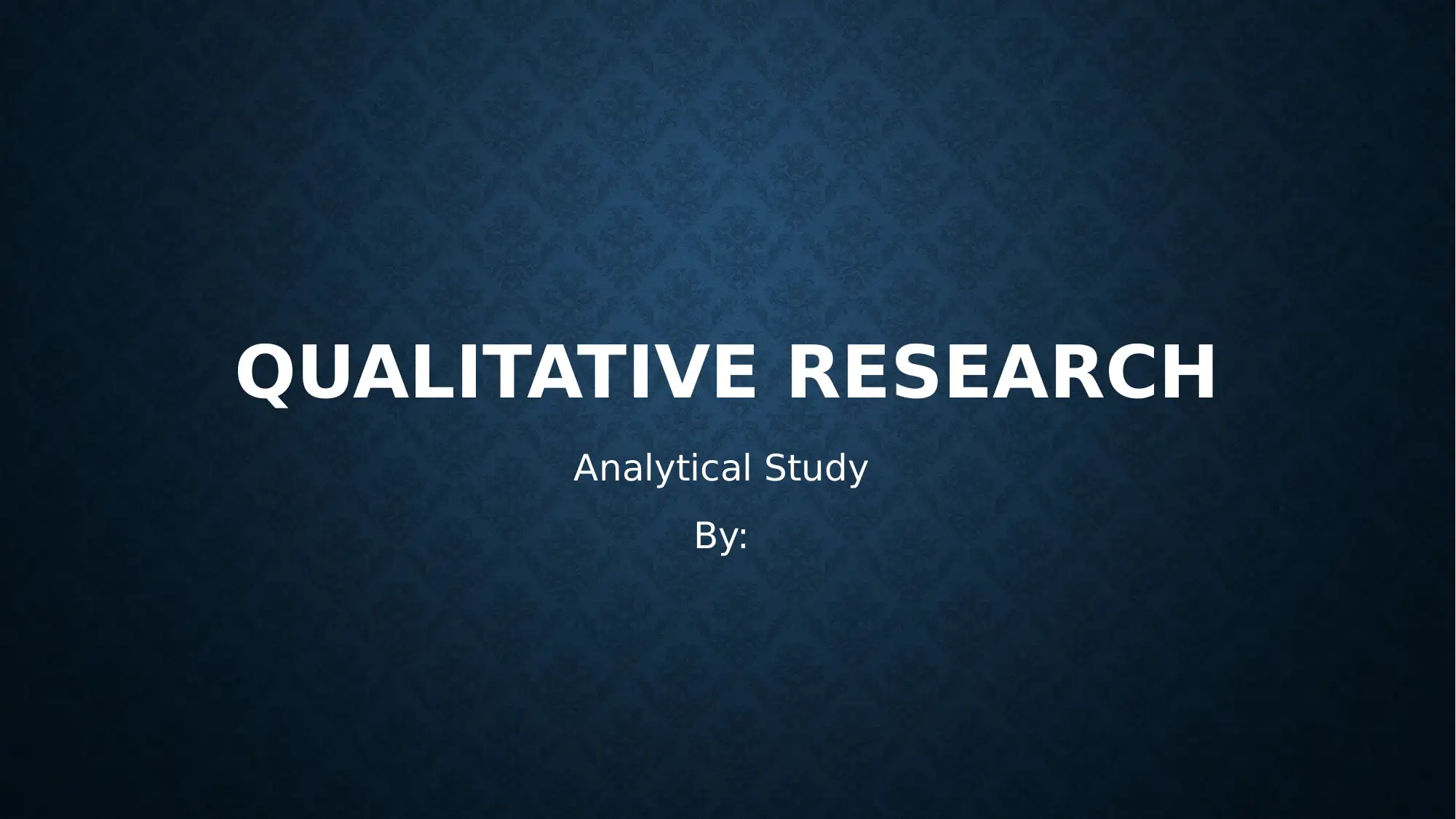
QUALITATIVE RESEARCH
Analytical Study
By:
Analytical Study
By:
Paraphrase This Document
Need a fresh take? Get an instant paraphrase of this document with our AI Paraphraser
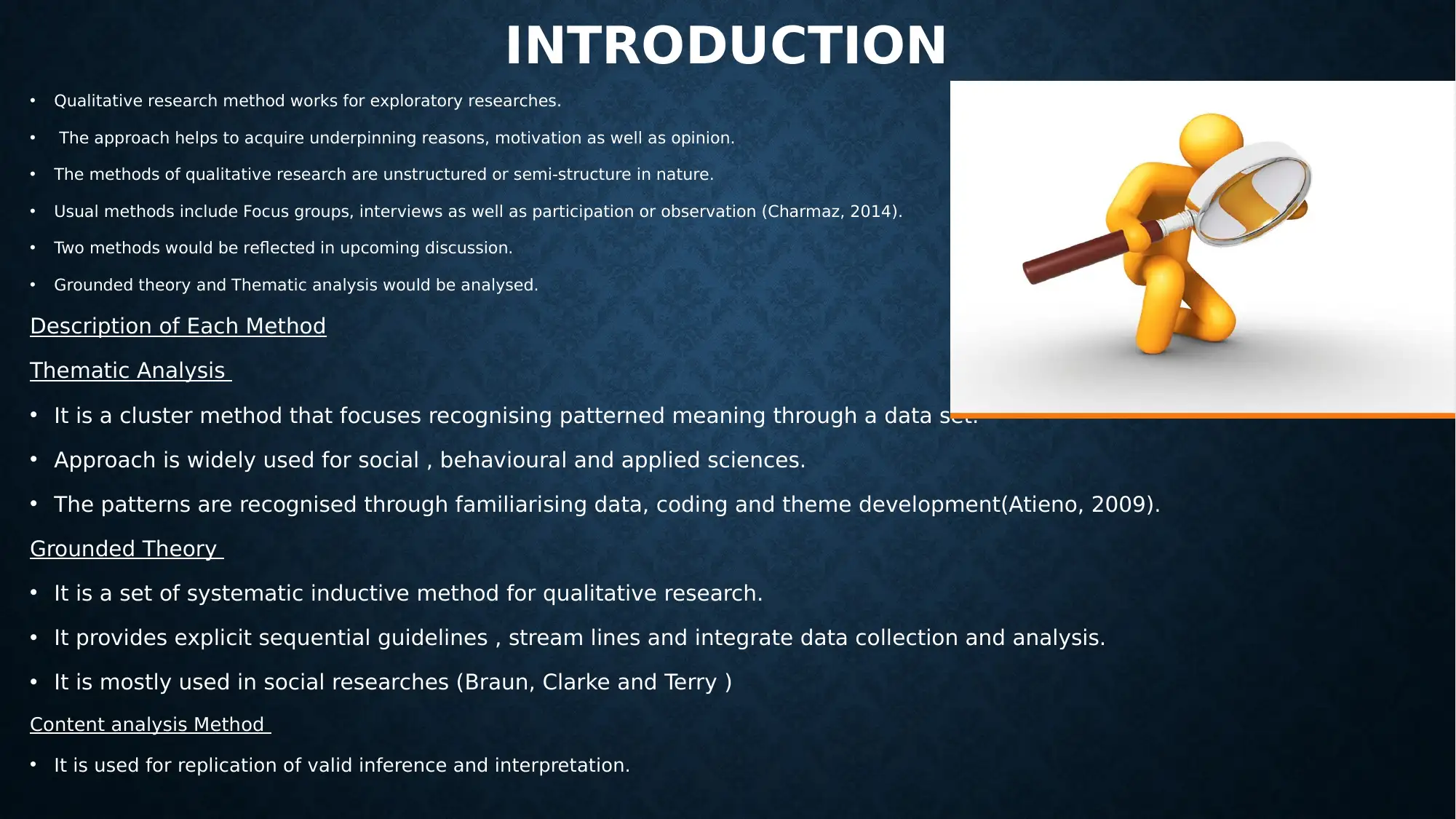
INTRODUCTION
• Qualitative research method works for exploratory researches.
• The approach helps to acquire underpinning reasons, motivation as well as opinion.
• The methods of qualitative research are unstructured or semi-structure in nature.
• Usual methods include Focus groups, interviews as well as participation or observation (Charmaz, 2014).
• Two methods would be reflected in upcoming discussion.
• Grounded theory and Thematic analysis would be analysed.
Description of Each Method
Thematic Analysis
• It is a cluster method that focuses recognising patterned meaning through a data set.
• Approach is widely used for social , behavioural and applied sciences.
• The patterns are recognised through familiarising data, coding and theme development(Atieno, 2009).
Grounded Theory
• It is a set of systematic inductive method for qualitative research.
• It provides explicit sequential guidelines , stream lines and integrate data collection and analysis.
• It is mostly used in social researches (Braun, Clarke and Terry )
Content analysis Method
• It is used for replication of valid inference and interpretation.
• Qualitative research method works for exploratory researches.
• The approach helps to acquire underpinning reasons, motivation as well as opinion.
• The methods of qualitative research are unstructured or semi-structure in nature.
• Usual methods include Focus groups, interviews as well as participation or observation (Charmaz, 2014).
• Two methods would be reflected in upcoming discussion.
• Grounded theory and Thematic analysis would be analysed.
Description of Each Method
Thematic Analysis
• It is a cluster method that focuses recognising patterned meaning through a data set.
• Approach is widely used for social , behavioural and applied sciences.
• The patterns are recognised through familiarising data, coding and theme development(Atieno, 2009).
Grounded Theory
• It is a set of systematic inductive method for qualitative research.
• It provides explicit sequential guidelines , stream lines and integrate data collection and analysis.
• It is mostly used in social researches (Braun, Clarke and Terry )
Content analysis Method
• It is used for replication of valid inference and interpretation.
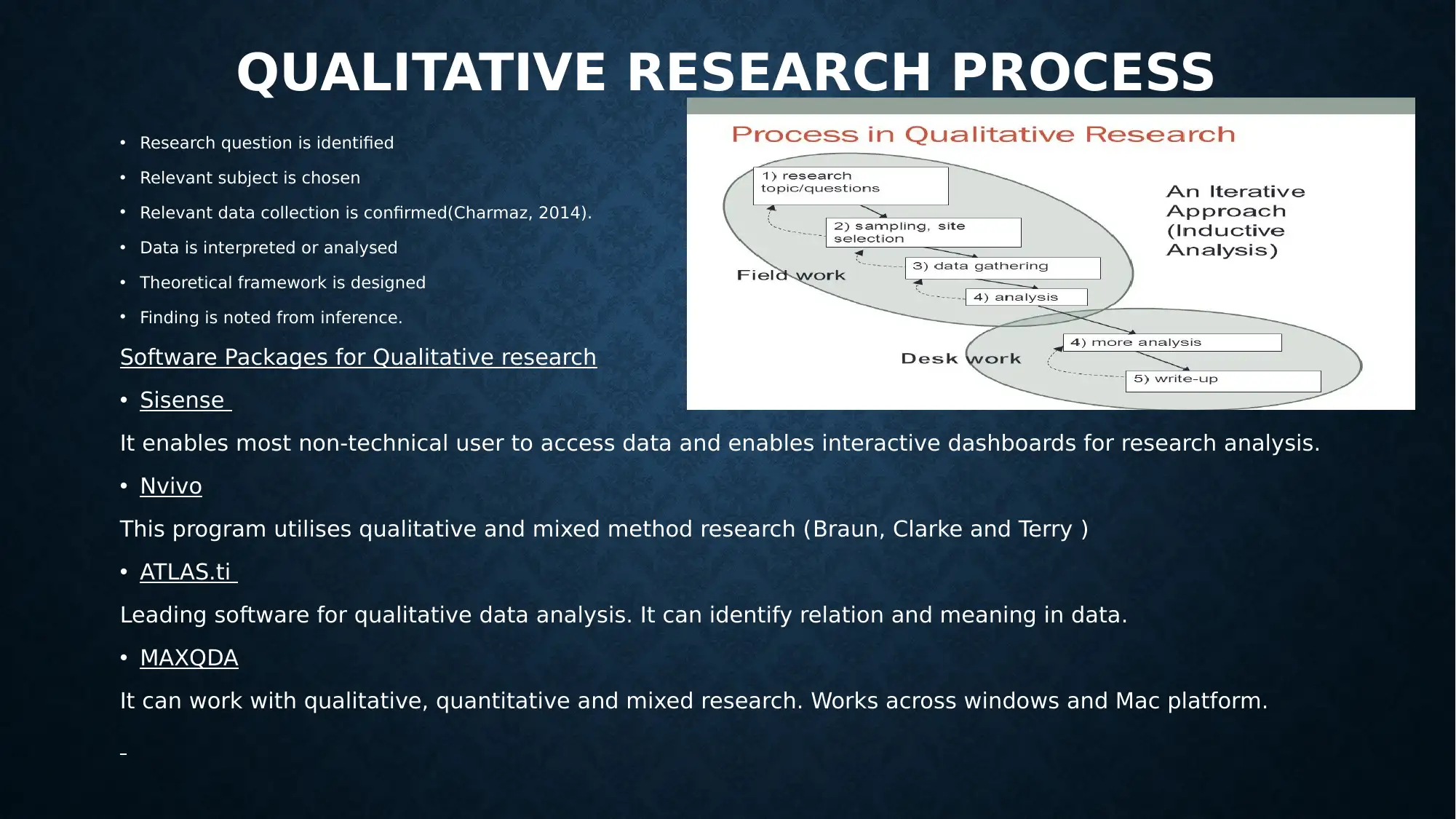
QUALITATIVE RESEARCH PROCESS
• Research question is identified
• Relevant subject is chosen
• Relevant data collection is confirmed(Charmaz, 2014).
• Data is interpreted or analysed
• Theoretical framework is designed
• Finding is noted from inference.
Software Packages for Qualitative research
• Sisense
It enables most non-technical user to access data and enables interactive dashboards for research analysis.
• Nvivo
This program utilises qualitative and mixed method research (Braun, Clarke and Terry )
• ATLAS.ti
Leading software for qualitative data analysis. It can identify relation and meaning in data.
• MAXQDA
It can work with qualitative, quantitative and mixed research. Works across windows and Mac platform.
• Research question is identified
• Relevant subject is chosen
• Relevant data collection is confirmed(Charmaz, 2014).
• Data is interpreted or analysed
• Theoretical framework is designed
• Finding is noted from inference.
Software Packages for Qualitative research
• Sisense
It enables most non-technical user to access data and enables interactive dashboards for research analysis.
• Nvivo
This program utilises qualitative and mixed method research (Braun, Clarke and Terry )
• ATLAS.ti
Leading software for qualitative data analysis. It can identify relation and meaning in data.
• MAXQDA
It can work with qualitative, quantitative and mixed research. Works across windows and Mac platform.
⊘ This is a preview!⊘
Do you want full access?
Subscribe today to unlock all pages.

Trusted by 1+ million students worldwide
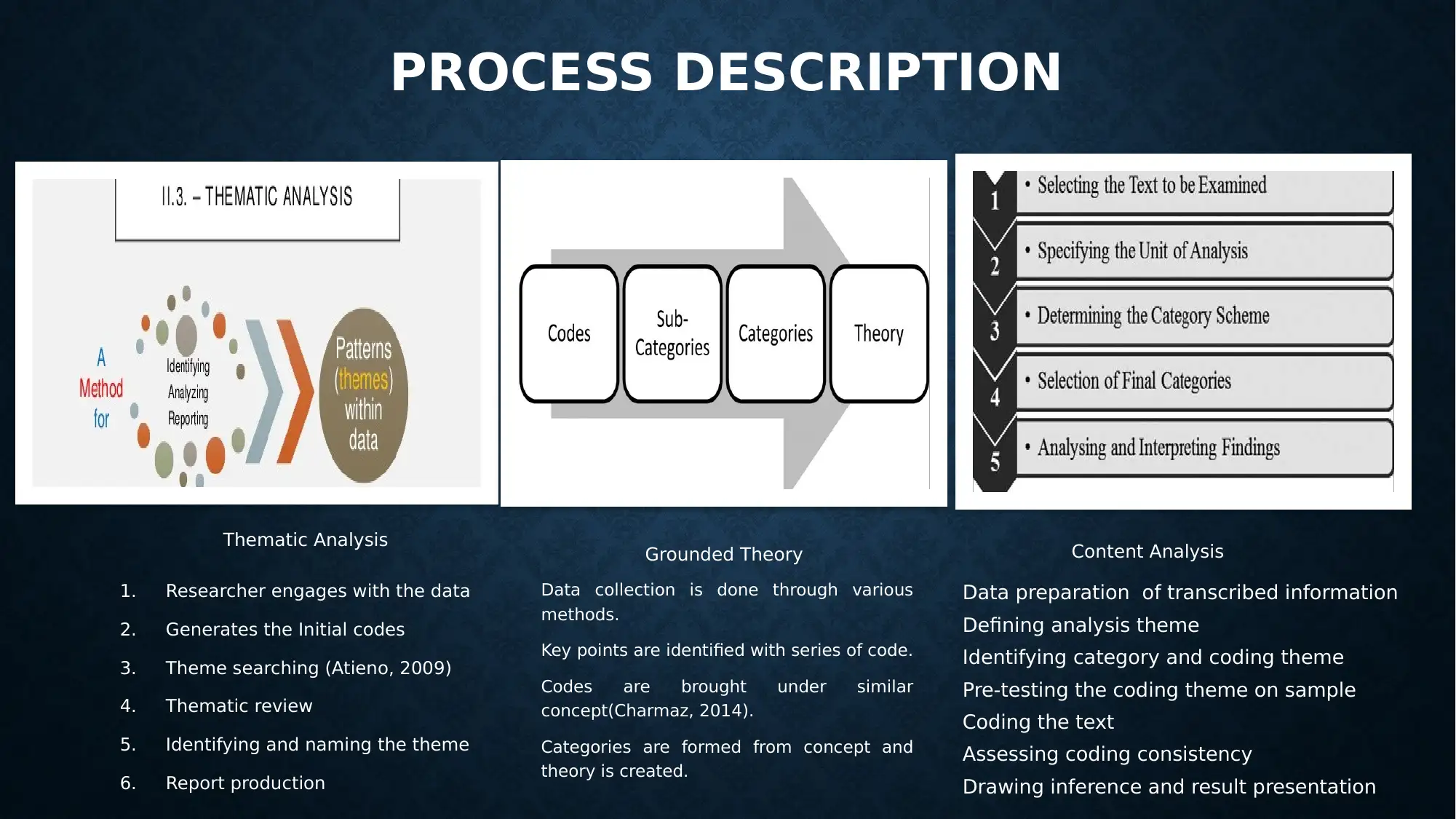
PROCESS DESCRIPTION
Thematic Analysis
1. Researcher engages with the data
2. Generates the Initial codes
3. Theme searching (Atieno, 2009)
4. Thematic review
5. Identifying and naming the theme
6. Report production
Grounded Theory
Data collection is done through various
methods.
Key points are identified with series of code.
Codes are brought under similar
concept(Charmaz, 2014).
Categories are formed from concept and
theory is created.
Content Analysis
Data preparation of transcribed information
Defining analysis theme
Identifying category and coding theme
Pre-testing the coding theme on sample
Coding the text
Assessing coding consistency
Drawing inference and result presentation
Thematic Analysis
1. Researcher engages with the data
2. Generates the Initial codes
3. Theme searching (Atieno, 2009)
4. Thematic review
5. Identifying and naming the theme
6. Report production
Grounded Theory
Data collection is done through various
methods.
Key points are identified with series of code.
Codes are brought under similar
concept(Charmaz, 2014).
Categories are formed from concept and
theory is created.
Content Analysis
Data preparation of transcribed information
Defining analysis theme
Identifying category and coding theme
Pre-testing the coding theme on sample
Coding the text
Assessing coding consistency
Drawing inference and result presentation
Paraphrase This Document
Need a fresh take? Get an instant paraphrase of this document with our AI Paraphraser
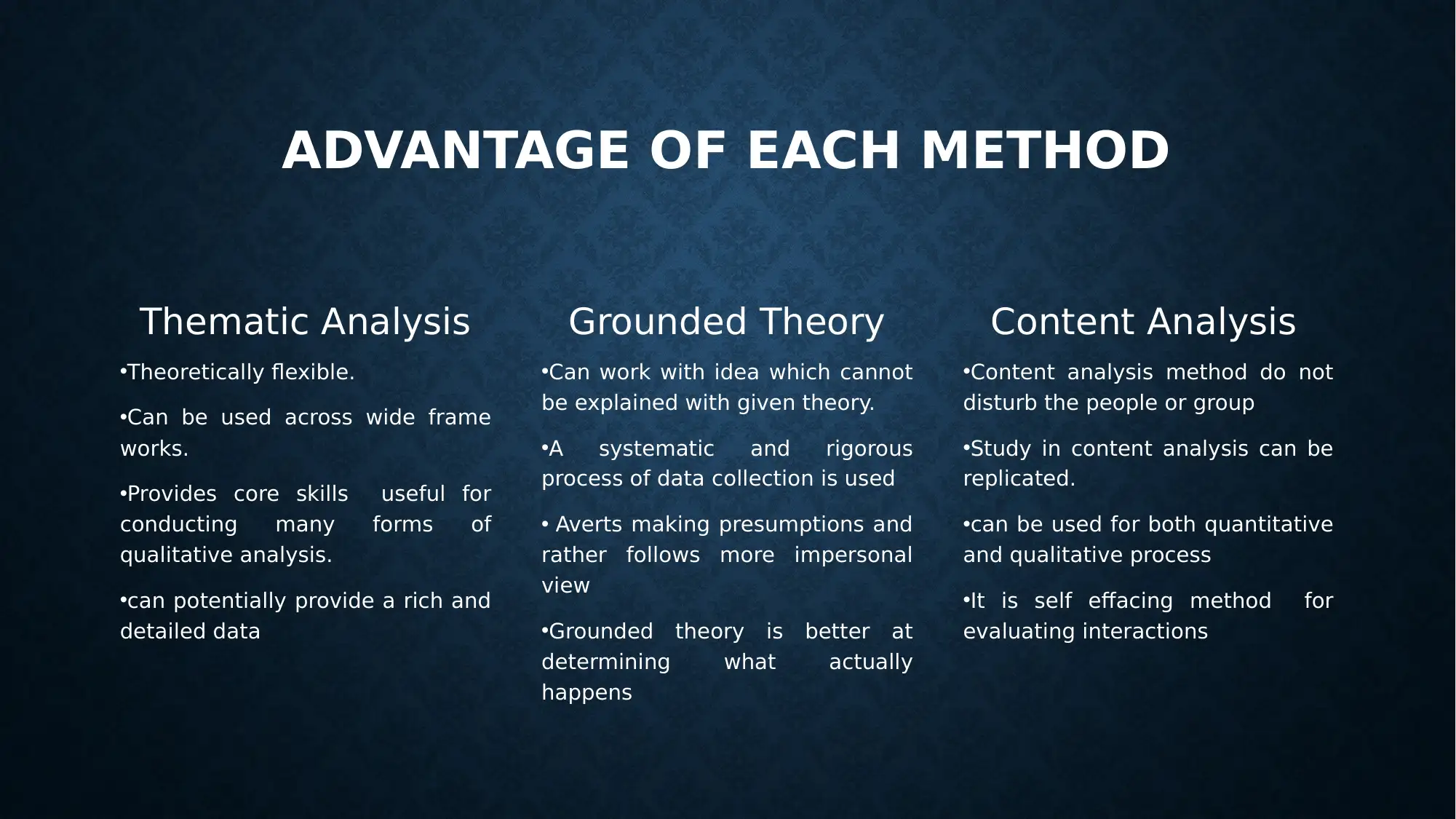
ADVANTAGE OF EACH METHOD
Thematic Analysis
•Theoretically flexible.
•Can be used across wide frame
works.
•Provides core skills useful for
conducting many forms of
qualitative analysis.
•can potentially provide a rich and
detailed data
Grounded Theory
•Can work with idea which cannot
be explained with given theory.
•A systematic and rigorous
process of data collection is used
• Averts making presumptions and
rather follows more impersonal
view
•Grounded theory is better at
determining what actually
happens
Content Analysis
•Content analysis method do not
disturb the people or group
•Study in content analysis can be
replicated.
•can be used for both quantitative
and qualitative process
•It is self effacing method for
evaluating interactions
Thematic Analysis
•Theoretically flexible.
•Can be used across wide frame
works.
•Provides core skills useful for
conducting many forms of
qualitative analysis.
•can potentially provide a rich and
detailed data
Grounded Theory
•Can work with idea which cannot
be explained with given theory.
•A systematic and rigorous
process of data collection is used
• Averts making presumptions and
rather follows more impersonal
view
•Grounded theory is better at
determining what actually
happens
Content Analysis
•Content analysis method do not
disturb the people or group
•Study in content analysis can be
replicated.
•can be used for both quantitative
and qualitative process
•It is self effacing method for
evaluating interactions
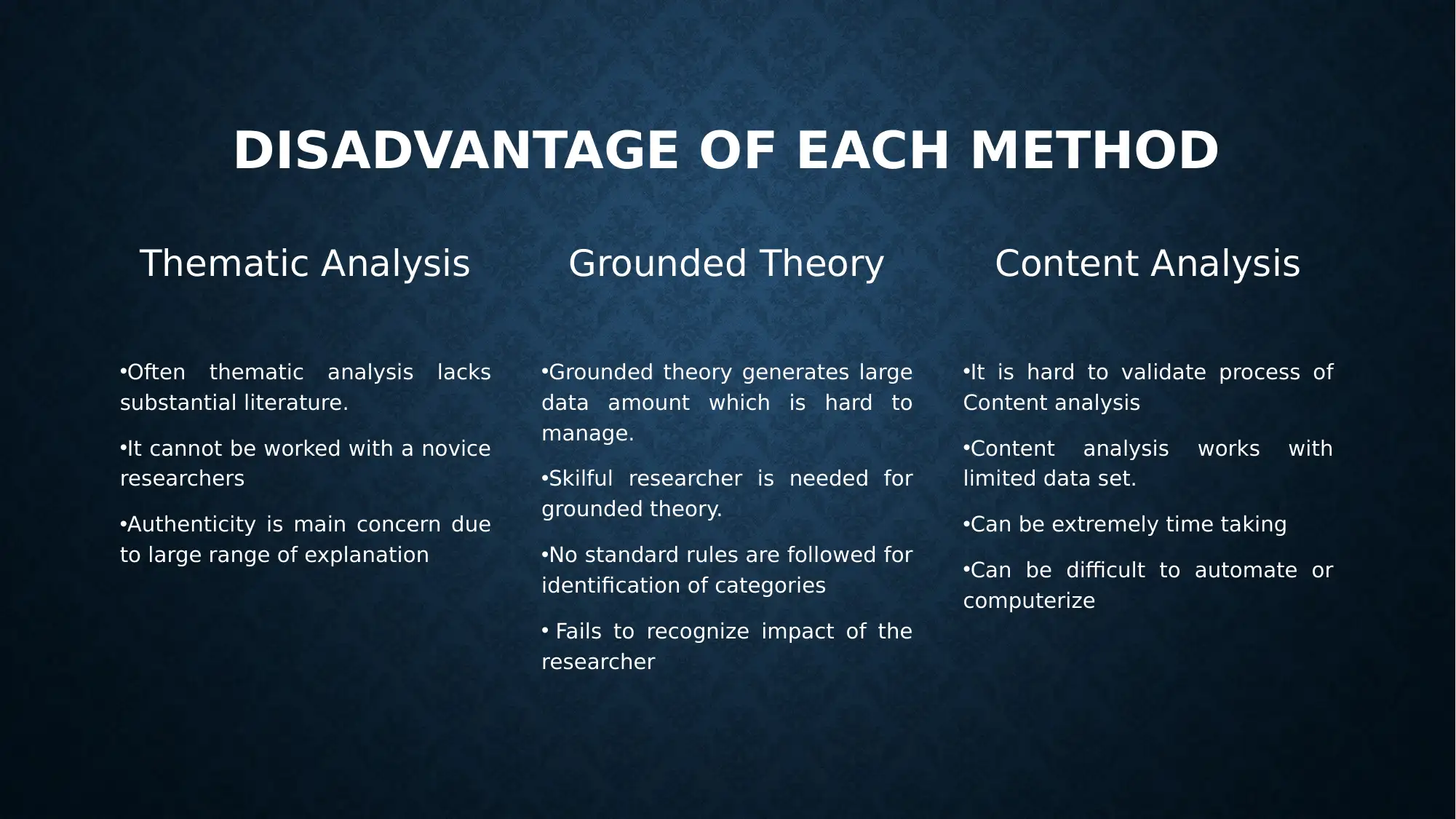
DISADVANTAGE OF EACH METHOD
Thematic Analysis
•Often thematic analysis lacks
substantial literature.
•It cannot be worked with a novice
researchers
•Authenticity is main concern due
to large range of explanation
Grounded Theory
•Grounded theory generates large
data amount which is hard to
manage.
•Skilful researcher is needed for
grounded theory.
•No standard rules are followed for
identification of categories
• Fails to recognize impact of the
researcher
Content Analysis
•It is hard to validate process of
Content analysis
•Content analysis works with
limited data set.
•Can be extremely time taking
•Can be difficult to automate or
computerize
Thematic Analysis
•Often thematic analysis lacks
substantial literature.
•It cannot be worked with a novice
researchers
•Authenticity is main concern due
to large range of explanation
Grounded Theory
•Grounded theory generates large
data amount which is hard to
manage.
•Skilful researcher is needed for
grounded theory.
•No standard rules are followed for
identification of categories
• Fails to recognize impact of the
researcher
Content Analysis
•It is hard to validate process of
Content analysis
•Content analysis works with
limited data set.
•Can be extremely time taking
•Can be difficult to automate or
computerize
⊘ This is a preview!⊘
Do you want full access?
Subscribe today to unlock all pages.

Trusted by 1+ million students worldwide
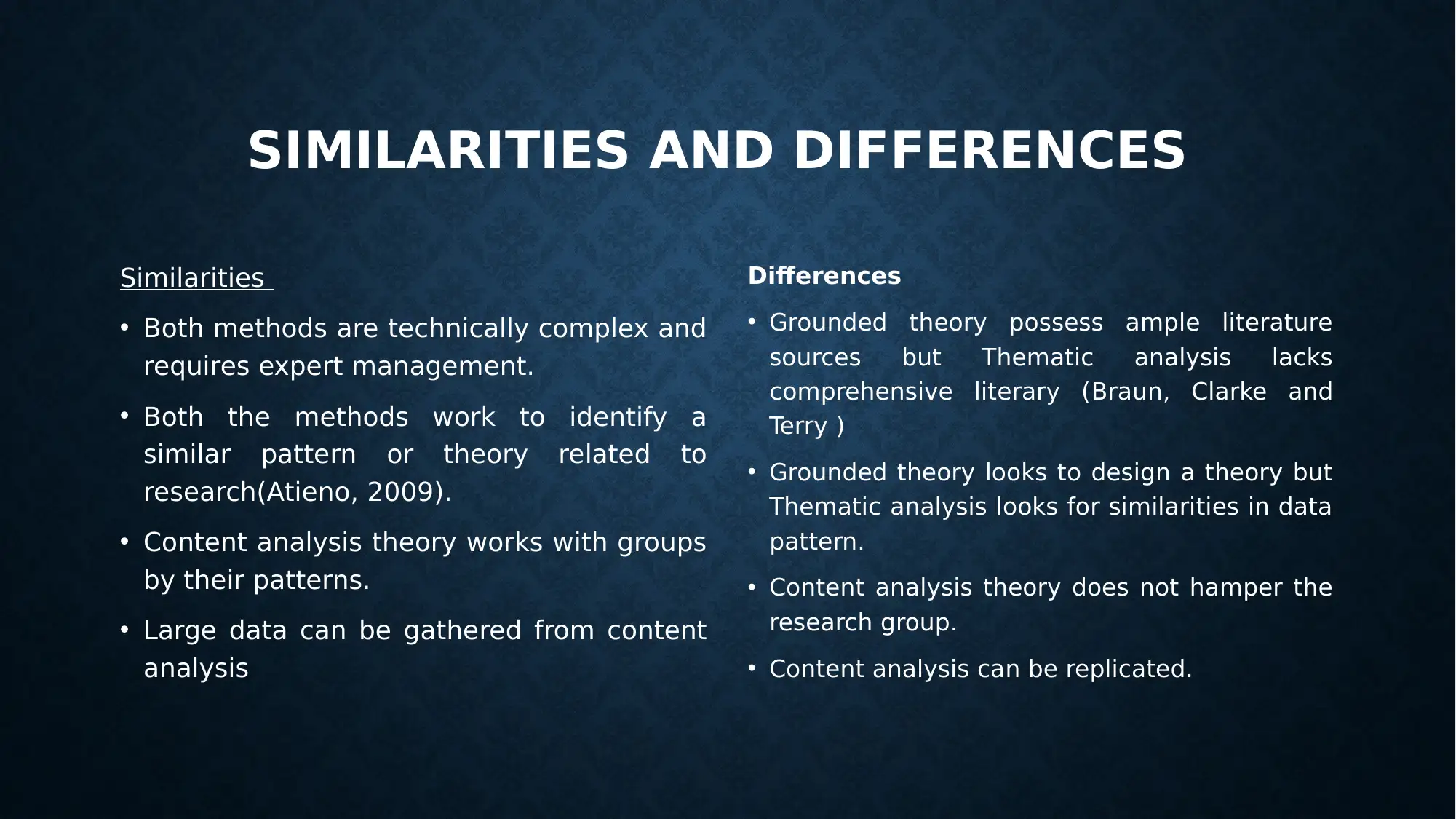
SIMILARITIES AND DIFFERENCES
Similarities
• Both methods are technically complex and
requires expert management.
• Both the methods work to identify a
similar pattern or theory related to
research(Atieno, 2009).
• Content analysis theory works with groups
by their patterns.
• Large data can be gathered from content
analysis
Differences
• Grounded theory possess ample literature
sources but Thematic analysis lacks
comprehensive literary (Braun, Clarke and
Terry )
• Grounded theory looks to design a theory but
Thematic analysis looks for similarities in data
pattern.
• Content analysis theory does not hamper the
research group.
• Content analysis can be replicated.
Similarities
• Both methods are technically complex and
requires expert management.
• Both the methods work to identify a
similar pattern or theory related to
research(Atieno, 2009).
• Content analysis theory works with groups
by their patterns.
• Large data can be gathered from content
analysis
Differences
• Grounded theory possess ample literature
sources but Thematic analysis lacks
comprehensive literary (Braun, Clarke and
Terry )
• Grounded theory looks to design a theory but
Thematic analysis looks for similarities in data
pattern.
• Content analysis theory does not hamper the
research group.
• Content analysis can be replicated.
Paraphrase This Document
Need a fresh take? Get an instant paraphrase of this document with our AI Paraphraser
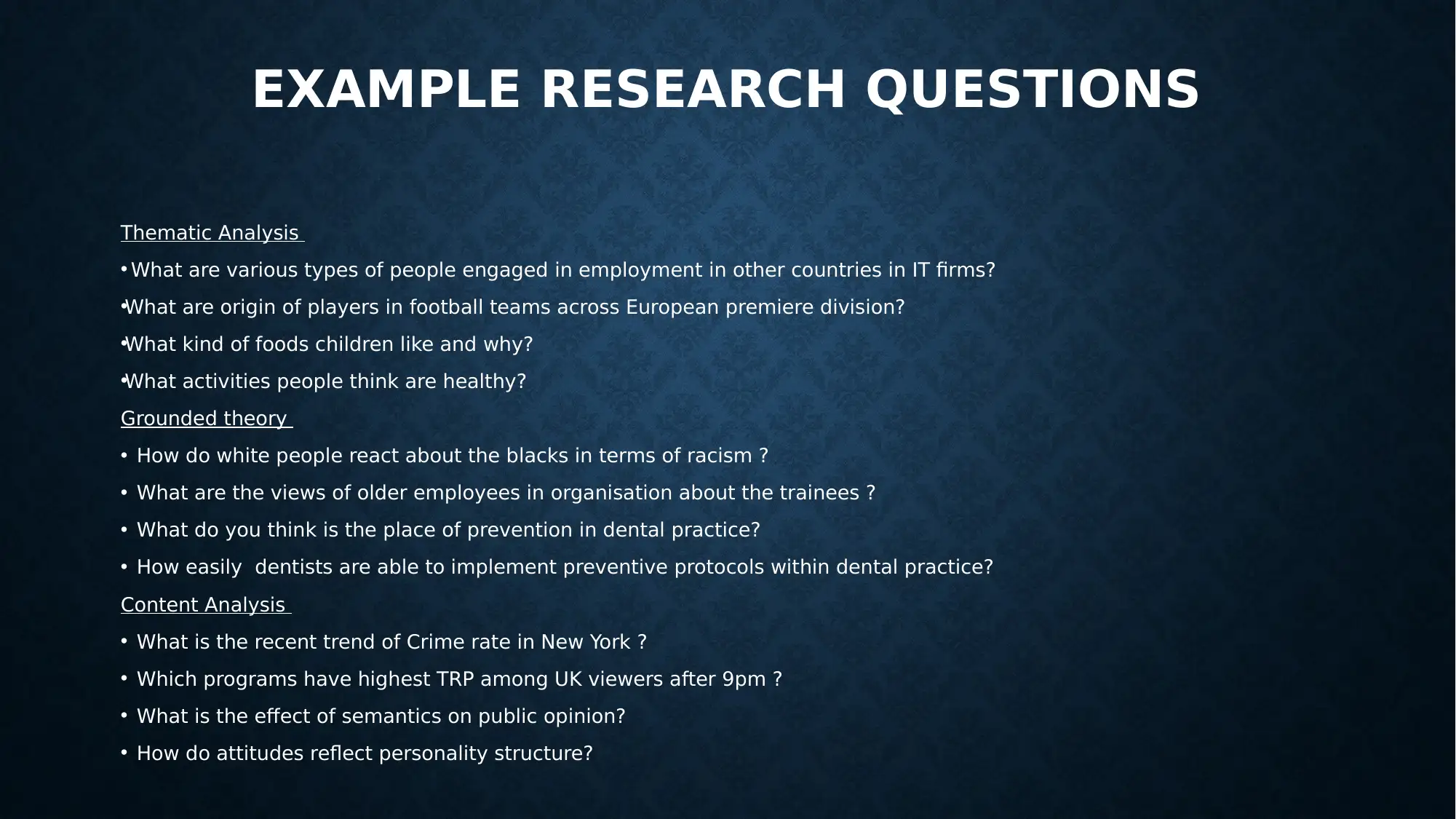
EXAMPLE RESEARCH QUESTIONS
Thematic Analysis
• What are various types of people engaged in employment in other countries in IT firms?
•What are origin of players in football teams across European premiere division?
•What kind of foods children like and why?
•What activities people think are healthy?
Grounded theory
• How do white people react about the blacks in terms of racism ?
• What are the views of older employees in organisation about the trainees ?
• What do you think is the place of prevention in dental practice?
• How easily dentists are able to implement preventive protocols within dental practice?
Content Analysis
• What is the recent trend of Crime rate in New York ?
• Which programs have highest TRP among UK viewers after 9pm ?
• What is the effect of semantics on public opinion?
• How do attitudes reflect personality structure?
Thematic Analysis
• What are various types of people engaged in employment in other countries in IT firms?
•What are origin of players in football teams across European premiere division?
•What kind of foods children like and why?
•What activities people think are healthy?
Grounded theory
• How do white people react about the blacks in terms of racism ?
• What are the views of older employees in organisation about the trainees ?
• What do you think is the place of prevention in dental practice?
• How easily dentists are able to implement preventive protocols within dental practice?
Content Analysis
• What is the recent trend of Crime rate in New York ?
• Which programs have highest TRP among UK viewers after 9pm ?
• What is the effect of semantics on public opinion?
• How do attitudes reflect personality structure?
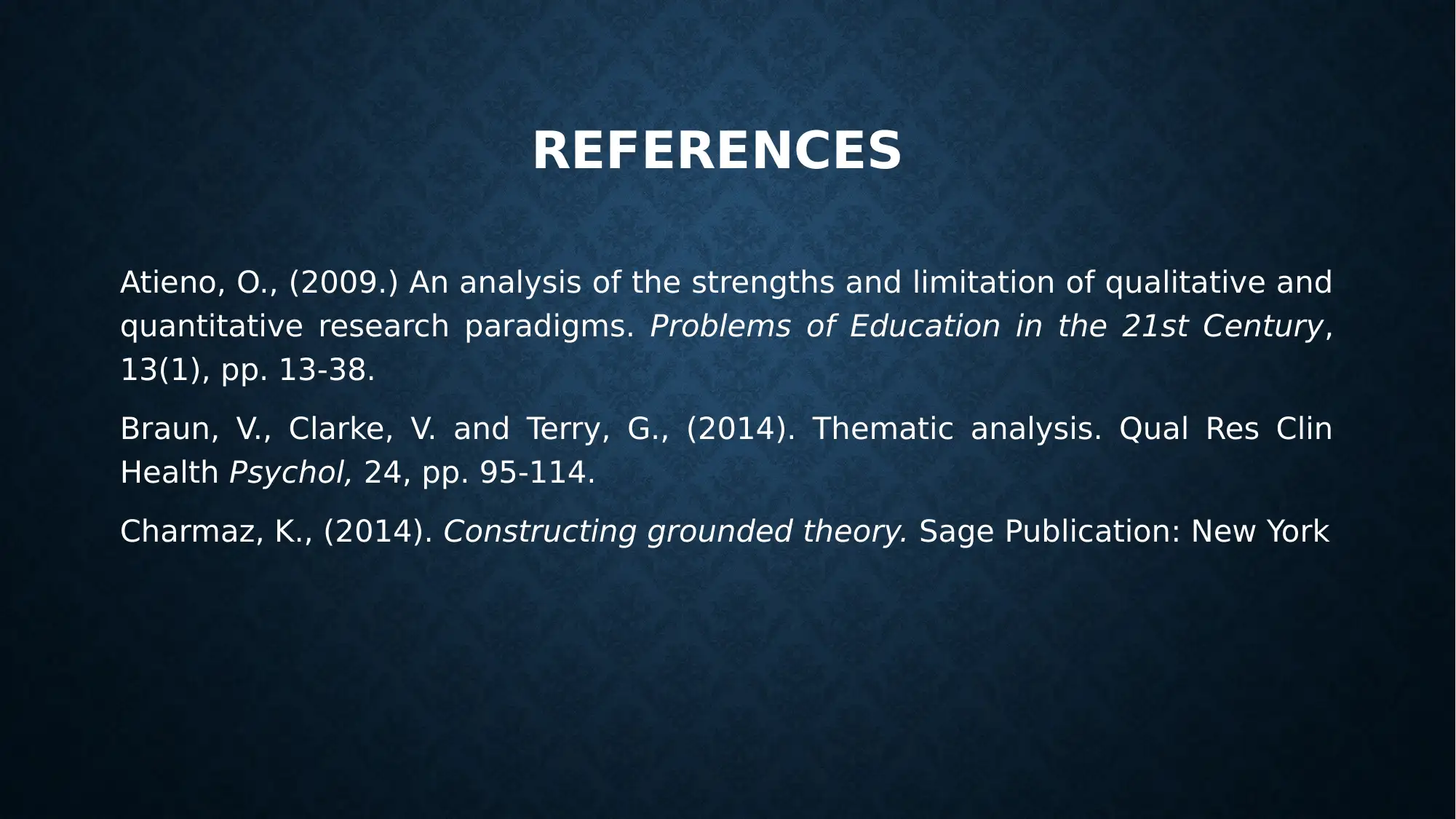
REFERENCES
Atieno, O., (2009.) An analysis of the strengths and limitation of qualitative and
quantitative research paradigms. Problems of Education in the 21st Century,
13(1), pp. 13-38.
Braun, V., Clarke, V. and Terry, G., (2014). Thematic analysis. Qual Res Clin
Health Psychol, 24, pp. 95-114.
Charmaz, K., (2014). Constructing grounded theory. Sage Publication: New York
Atieno, O., (2009.) An analysis of the strengths and limitation of qualitative and
quantitative research paradigms. Problems of Education in the 21st Century,
13(1), pp. 13-38.
Braun, V., Clarke, V. and Terry, G., (2014). Thematic analysis. Qual Res Clin
Health Psychol, 24, pp. 95-114.
Charmaz, K., (2014). Constructing grounded theory. Sage Publication: New York
⊘ This is a preview!⊘
Do you want full access?
Subscribe today to unlock all pages.

Trusted by 1+ million students worldwide
1 out of 9
Related Documents
Your All-in-One AI-Powered Toolkit for Academic Success.
+13062052269
info@desklib.com
Available 24*7 on WhatsApp / Email
![[object Object]](/_next/static/media/star-bottom.7253800d.svg)
Unlock your academic potential
Copyright © 2020–2026 A2Z Services. All Rights Reserved. Developed and managed by ZUCOL.





